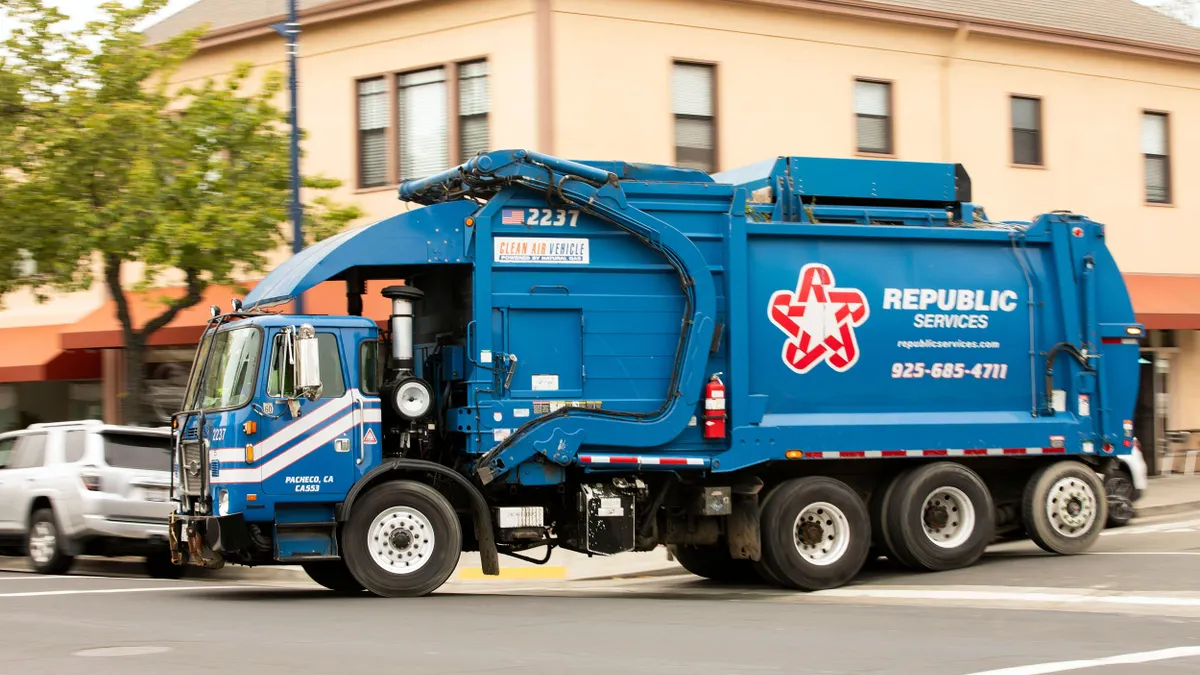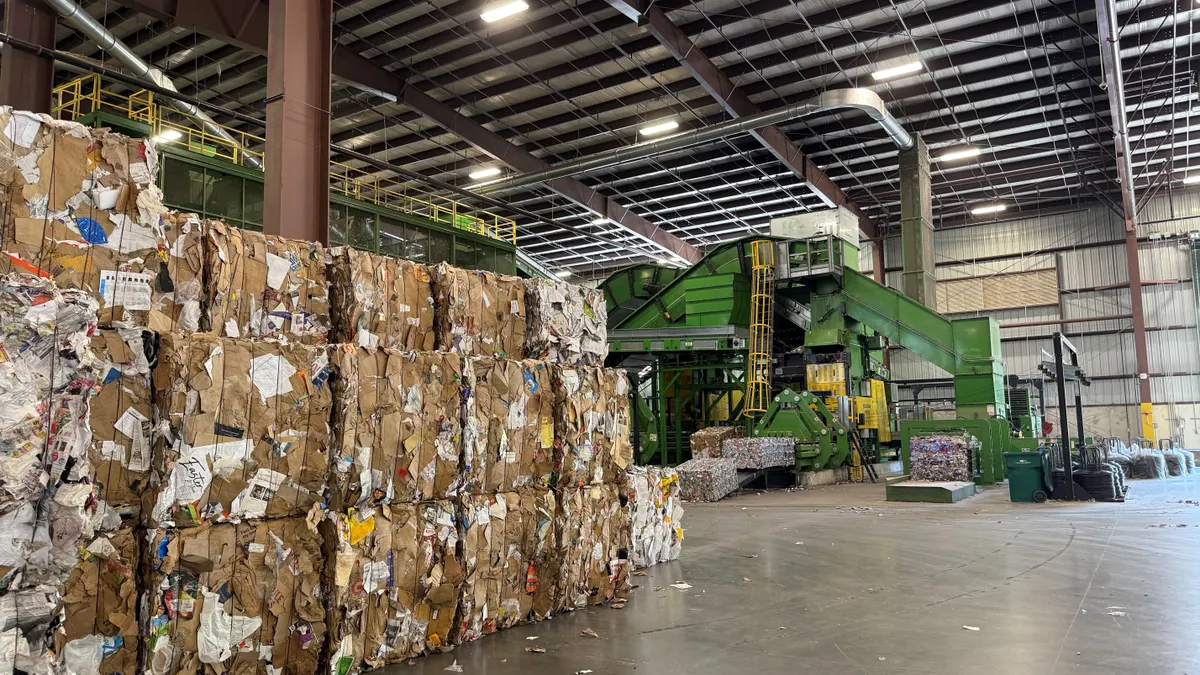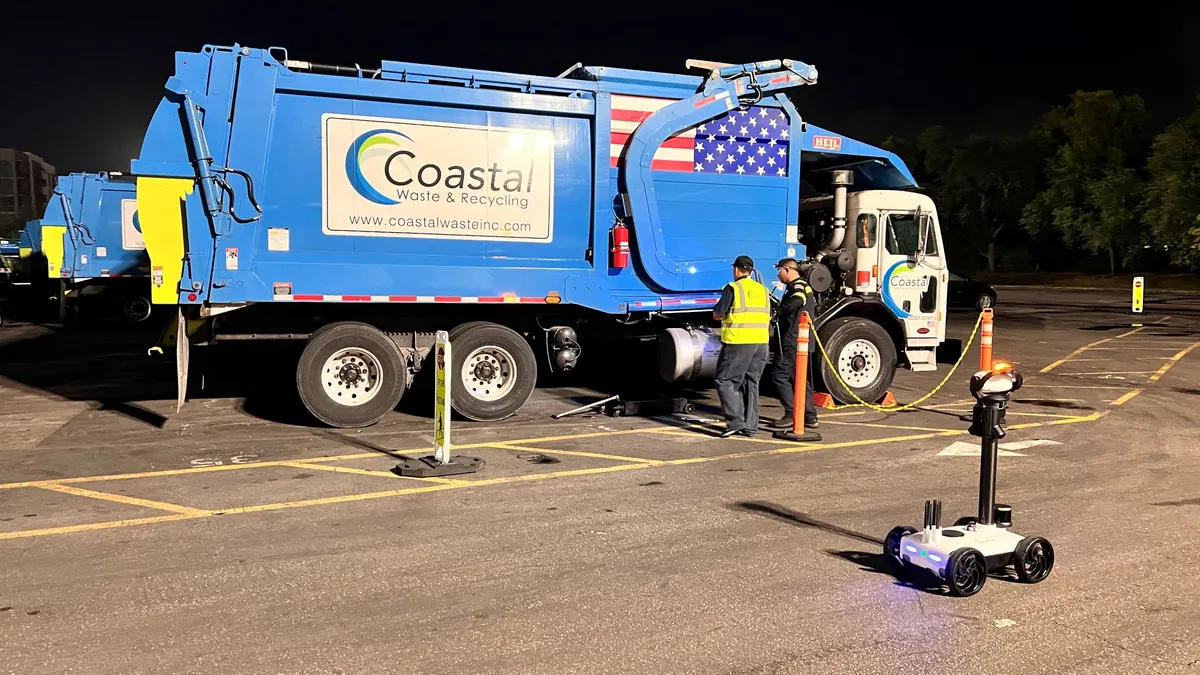The coronavirus pandemic has upended daily life and commerce throughout the United States in recent weeks. The waste and recycling industry's essential services continue, but for frontline workers it is no longer business as usual.
Beyond guidance for carefully handling medical waste from COVID-19 cases (a critical and evolving concern), the way MSW is managed may also have to adapt. While disagreement remains about the risk level to workers on collection routes or MRF sorting lines, absence rates could potentially increase if workers are affected by the disease (or it affects someone they need to care for) and spark an entirely new type of operational challenge.
"Workers are at the epicenter of really trying to work to be the solution for the community, to be able to cope with the crisis and then sort of rebound afterwards," Peter Dooley, senior project coordinator for the National Council for Occupational Safety and Health (COSH), told Waste Dive. “But they need to be protected in order to protect the community.”
PPE and social distancing
As the situation evolves rapidly, workplaces have been trying to keep up with new information about how the disease can spread. While consensus remains that respiratory transmission is the highest and most common risk, new research began circulating last week that also raised ongoing concerns about surface transmission.
The findings – published by the National Institute of Allergy and Infectious Diseases (NIAID), Centers for Disease Control and Prevention (CDC) and multiple universities – indicates COVID-19 can live on materials such as cardboard and plastic, in some cases for as many as three days. This has prompted service providers throughout the country to alter their collection policies with some saying they won't collect any loose items outside of bags or carts, or won't collect recycling at all.
A spokesperson for NIAID told Waste Dive that no one from its team was available to answer questions about implications for waste and recycling workers, even via email, "due to the priority of their research work."
Current guidance from the CDC and U.S. Occupational Safety and Health Administration (OSHA) says no additional precautions are needed for handling solid waste that might be infected beyond normal personal protective equipment (PPE) used for medical waste. OSHA did not share a response to the NIAID findings, or other related questions, as of publication.
Dooley from National COSH said this situation puts all workers at "heightened risk," but at this time the guidance points to respiratory transmission as the primary and most pressing factor.
Meanwhile, multiple operators have raised questions about interacting with the disease when handling curbside material and possibly even acting to spread it among fellow employees, or along the route.
“There have been some concerns raised, and we’ve worked with CDC and OSHA to fully understand them," Kirk Sander, vice president of safety and standards for the National Waste & Recycling Association (NWRA) told Waste Dive. "Currently, the PPE that we normally use has been deemed sufficient."
One group that has raised this question is the International Brotherhood of Teamsters. The union sent letters to CEOs of major companies on Monday citing this concern, along with many other questions about PPE and safety. Nearly half of the 32,000 waste workers it represents are employed by Waste Management, Republic Services or Waste Connections.
“The Covid-19 pandemic poses a serious and unique risk to the 6,000 Teamsters employed by Waste Management. Over the course of each workday, our members visit thousands of homes, businesses, schools and hospitals," said Chuck Stiles, director of the union's waste and recycling division, in one letter.
Asked more generally about safety precautions it has taken to protect workers against COVID-19 (as well as any response to the Teamsters letter) Waste Management said it was working to respond to inquiries from multiple unions "as soon as possible."
To the question of possible surface transmission, spokesperson Janette Micelli wrote on Wednesday that "waste handling is not a disease pathway and has not been identified as needing any special precaution by the [World Health Organization] or CDC."
Micelli noted the company is advising employees to always wear proper PPE such as gloves and safety glasses. Waste Management has limited all in-person meetings, with any non-essential personnel working from home, to follow social distancing requirements. Employees that can work remotely include those in call centers, sales centers, dispatch centers, the shared services team and other office staff. The company is making "substantial" investments in technology to accommodate the shift.
Waste Management also reported changes at its MRFs, something other companies have yet to discuss publicly.
"Specifically for MRF’s, we have changed all operations to social distancing, which includes repositioning of sorters, staggering breaks, and huddles. Where distancing is not possible, we are creating temporary barriers between sorting stations as long as the barriers do not create a safety issue," said Micelli.
In another example of social distancing affecting operations, California-based Recology recently posted a notice from CEO Michael Sangiacomo that collection shifts have been staggered to reduce headcount and some work will now be happening overnight. New York's Department of Sanitation has also started its shifts earlier to avoid crowds, along with other heightened precautions, according to a story by Politico. The Southeast Recycling Development Council has also posted reported collection changes in certain states due to social distance requirements.
Republic Services declined to share any specific information about different safety precautions. An unidentified spokesperson told Waste Dive on Wednesday the company was taking this issue "very seriously" and regularly "consulting with public health experts and other advisors" to ensure safety. "The COVID-19 situation is evolving rapidly, and we are confident that we have the right business continuity plans in place to quickly respond to circumstances that may impact our business," they said.
Waste Connections executives did not reply to a request for comment about the Teamsters letter or any other safety precautions.
Speaking broadly about both private and public sector operators on Monday, Solid Waste Association of North America CEO David Biderman told Waste Dive he had not heard of major concerns around surface transmission if PPE was being used. He caveated MRFs could be an environment to watch as operators of various sizes work to adapt.
“The majority of the companies that I’ve spoken with, they’re being proactive and keeping their workers apart from each other and sanitizing both the [truck] cabs and the administrative staff workplaces," Biderman told Waste Dive. “I think the industry is taking this seriously, and appropriately so."
Paid leave and operational challenges
Companies are beginning to adapt to what may be the new near-term reality. The NWRA, which has been engaged in a variety of requests and discussions around temporarily changing hours-of-service (HOS) requirements and other regulations, projected possible "upheavals in the way material is managed" in a March 16 letter sent to state agencies.
Potential scenarios include challenges selling recyclable materials, limited PPE availability "due to panic buying by the public," and "difficulty in achieving social distancing of employees based on sort line configurations." That is in addition to multiple issues related to absenteeism — employees may become ill with the virus, have to care for someone else who is ill or have their schedules affected by childcare needs due to school and daycare closures.
The concern for workers across many essential industries, including waste and recycling, is whether their current benefits are adequate to handle all of these scenarios. While legislation is moving at the federal level that could address this, initial versions appear to exempt large employers in some cases.
In conversation with Waste Dive, Teamsters representatives indicated they had not been given full confidence so far during initial discussions with employers that all workers would have the necessary leeway to cope. Their letter to CEOs put that question in stark terms.
“[D]ue to your company’s existing attendance policies, infected employees may find themselves without sufficient PTO time or unable to afford to take unpaid medical leave. In order to keep their jobs and livelihood, the same infected employees would likely report to work," wrote Stiles, the union director. "Should this likely scenario play out, the virus could quickly spread throughout your workforce. A drop in waste collection service during an emerging pandemic would make a deadly situation infinitely worse.”
While Republic Services and Waste Connections shared no information on this issue, Waste Management indicated changes could be coming.
"Waste Management is taking various emergency measures to limit the impact the COVID-19 virus outbreak may have on our employees and their families," said Micelli. "While the details of these measures are being finalized, we are committed to ensuring our employees receive compensation throughout the duration of this pandemic if they become ill. In addition, we have amended our attendance policies and child and dependent care benefits for those impacted."
Many anticipate there will be some level of absenteeism during the pandemic. In the case of MRFs that use incarcerated labor that has already become evident in multiple states, leading to temporary program suspensions.
For operations that continue they could still see remaining employees becoming fatigued, especially those operating under pressure to make up for lost productivity from a decreased workforce. Fatigue is a known injury risk in any situation. It may also be a factor in how the industry, and regulators, approach requests such as HOS changes that aren't traditionally designed to be altered for extended periods of time.
“Depending on when this hits, and how it hits, we’re going to have to reassess depending on what the needs are," said Sander.
The pandemic could continue to create challenges for the U.S. waste industry for weeks or months - uncertainty that could stretch into any recovery period and inform what comes next.
"Hopefully we’re going to get through this and be able to resolve the crisis and get back to sort of normal operations, but it’s likely that the whole issue of infectious disease will face us in the future," said Dooley. "So it’s definitely something that we need to learn from and have institutional memory for."




















